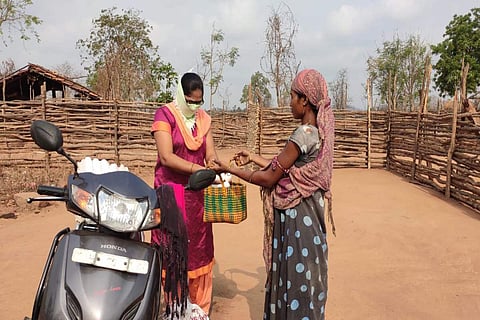

50-year-old Thati Nagalaxmi, an anganwadi teacher, walks around 4 km carrying ration supplies, switching the weight between her head and shoulders, almost twice a week to reach the Guttikoya hamlets near Aswapuram village in Telangana’s Bhadradri Kothagudem district. The journey to the adivasi villages is a hard one, considering Nagalaxmi’s age, the weather and the unfinished roads. These hamlets are one of the most remote villages in the state.
As India has imposed a national lockdown to ‘flatten the curve’ of COVID-19, it has become the job of these anganwadi teachers to feed the poor children, pregnant and lactating women by delivering rations— eggs, rice, dal, milk powder— to them, right at their doorstep.
Banothu Jyothi, anganwadi teacher from Laxmidevipalli mandal in Kothagudem delivering ration supply
Besides this regular work, they have been given the additional responsibility of conducting household surveys (checking for people with travel history), carrying out awareness campaigns and maintaining surveillance of people’s health.
Nagalaxmi says, “As we have been instructed to distribute the ration to each household, I walk around 4 km to the adivasi hamlets to give them their week’s supply.” The anganwadi workers also have to check the health of pregnant women, weigh the children, to check if they are healthy.
As per the government’s ration, each pregnant and lactating woman is provided with 150 grams of rice, 16 grams of oil, 30 grams of dal and an egg every day. Children from the age of 4-5 are provided with 75 grams of rice, 15 grams dal, 5 gram oil along with an egg daily. Children between the ages of six months and 3 years are provided with 250 grams of milk powder and 16 eggs per month.
Though burdened with work and facing the real risk of potentially contracting the disease, these brave women are working selflessly. They have taken upon themselves to keep residents safe from COVID-19 in their respective villages.
K Sunitha, an anganwadi teacher from Adilabad, has been receiving a lot of appreciation from district officials for her remarkable service. Sunitha, who has expertise in tailoring, used her skills to stitch around 250 masks and distributed them to sanitation workers, her colleagues and to beneficiaries.
“It is my village, of course I have to take care of them,” she says beaming with pride and adds, “I finish my work (surveillance, distribution of ration and conducting household survey) before noon and do this (stitch masks).”
Though she never expected any incentive for this service, the acknowledgement from authorities has renewed Sunitha’s vigour to take care of the villagers.
Overwhelmed with the appreciation, she says, “In my 15 years of service, this is the first time I'm being recognised.”
Another anganwadi teacher, R Sunitha from Narayanapuram village in Khammam district, turned into a celebrity when the Department of Women Development and Child Welfare acknowledged her service publicly on Twitter by disclosing how she helped the migrant labourers from Orissa who were stranded in her village owing to the lockdown.
Meet Sunitha, our Anganwadi teacher from Khammam showing us the true spirit of Humanity!#MondayMotivaton #ThankYouCoronaWarriors #COVID__19 #CoronaWarriors @Collector_KMM @DonitaJose @ndtv @sakshinews @TV9Telugu pic.twitter.com/VUw5OWrWSy
— WCDTelangana (@WCDTelangana) April 13, 2020
27 workers from Malkangiri were left without any wages and food to eat. Sunitha, in addition to providing them with the government-mandated benefits (12 kg rice per person and Rs 500), pooled in her own money to buy them rice, vegetables and sanitary items. Other residents of the village, too, came forward and are taking care of the migrant workers. Since the workers did not have jobs, village officials have provided them employment in a chilli farm to sustain themselves
.
“They are our guests. How can we look away when they are starving?” Sunitha asks. Since they are on the other side of the stream, one has to walk a distance of 2 km to reach them. Sunitha makes a visit almost every week to check on them.